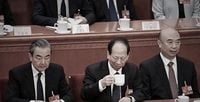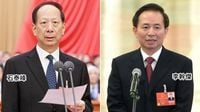In a significant reshuffle within the upper echelons of the Chinese Communist Party (CCP), Shi Taifeng has been appointed as the head of the Central Organization Department, while Li Ganjie takes over as the head of the Central United Front Work Department. This unexpected exchange of positions, confirmed on April 2, 2025, marks a rare occurrence in the party's history and hints at potential shifts in the CCP's strategy towards Taiwan.
The pro-Beijing Sing Tao Daily reported that during a Politburo meeting held on March 31, 2025, presided over by CCP General Secretary Xi Jinping, discussions included personnel adjustments that led to this leadership change. Both Shi and Li are members of the Politburo, but not part of the core seven-member Standing Committee, making this swap particularly noteworthy.
The Central Organization Department is considered the most powerful within the CCP, overseeing personnel management and the promotion of senior officials. In contrast, the United Front Work Department is responsible for managing relations with non-party members and is often regarded as the CCP's largest intelligence agency. This department's responsibilities include fostering support among overseas Chinese and various social groups, including religious organizations.
Shi Taifeng, 68, has a long history within the CCP, having served in various capacities, including as the secretary of the Suzhou Municipal Party Committee and the governor of Jiangsu Province. He was also the secretary of the Ningxia Hui Autonomous Region and the Inner Mongolia Autonomous Region before becoming the head of the United Front Work Department in October 2022. His new role in the Central Organization Department will see him supervising the appointments and promotions of senior officials.
Li Ganjie, 60, is recognized as a nuclear safety expert and one of the youngest members of the Politburo. His career has been marked by significant roles in the Environmental Protection Department, where he served as deputy minister and later as the minister of the newly formed Ministry of Ecology and Environment. His background in technical and environmental matters is expected to influence his approach to the United Front Work Department, particularly as it relates to non-party members.
Analysts suggest that this leadership change may reflect deeper factional struggles within the CCP, particularly between the factions associated with Xi Jinping and those aligned with other party leaders. Commentator Li Linyi noted that if the exchange is confirmed, it could signal a major shift in the CCP's strategy towards Taiwan, especially given the recent pushback from Taiwan against CCP infiltration efforts.
Li highlighted that Shi Taifeng has held significant power since 2022, serving as vice chairman of the Chinese People's Political Consultative Conference and ranking second in the Central Secretariat. This arrangement, along with the roles of Wang Huning and Song Tao, underscores Xi Jinping's strategy of attempting to influence Taiwan through a combination of outreach and infiltration.
The reshuffle also raises questions about the future of Li Ganjie in his new position. While he is seen as a capable technocrat, analysts believe he may face challenges in effectively managing the United Front Work Department, which requires a different set of skills compared to his previous roles.
This personnel exchange is unprecedented; there has never been a situation where members of the Politburo have swapped positions in this manner. Traditionally, such high-level leadership roles are held for five-year terms, which adds another layer of complexity to this situation.
As the CCP navigates these changes, the implications for Taiwan and the broader geopolitical landscape remain to be seen. The party's ability to adapt its strategy in response to external pressures and internal dynamics will be crucial in the coming months.
In addition to the leadership changes, the CCP's recent meetings and discussions around personnel adjustments highlight an ongoing focus on consolidating power and ensuring loyalty within the ranks. The Central Organization Department, along with the Central Propaganda Department and the United Front Work Department, forms the backbone of the party's operational framework.
Shi Taifeng's extensive experience at the Central Party School and his close association with Xi Jinping during their time there may provide him with the necessary insights to navigate the complexities of his new role. Meanwhile, Li Ganjie's expertise in environmental issues may bring a fresh perspective to the United Front Work Department, particularly as the CCP seeks to engage with various social groups.
As the CCP continues to grapple with its internal dynamics and external challenges, the ramifications of this leadership reshuffle will likely play a significant role in shaping the party's future direction. Observers will be keenly watching how these changes impact the CCP's approach to Taiwan and its overall strategy in the region.
In conclusion, the recent exchange of leadership roles between Shi Taifeng and Li Ganjie signifies not only a rare event in the CCP's history but also a potential turning point in the party's strategy towards Taiwan and its internal power dynamics.





